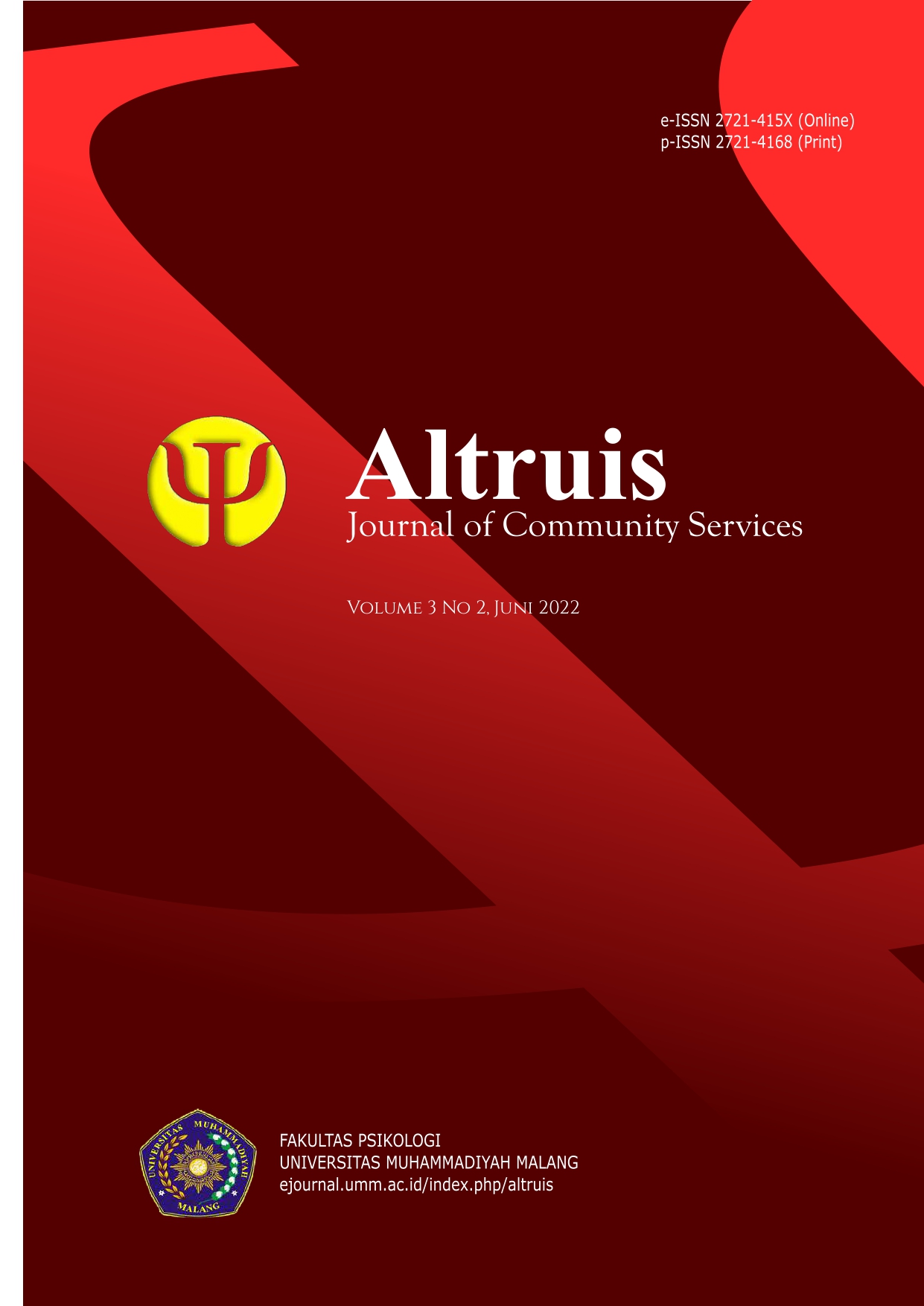Bermain origami untuk melatih keterampilan motorik halus anak usia dini
DOI:
https://doi.org/10.22219/altruis.v3i2.21501Keywords:
Early Childhood, Fine Motor Skills, OrigamiAbstract
The development of fine motor skills in children age 2-12 years old is important because it is related to other developmental tasks, such as independence, cognitive abilities, etc. In fact, not many parents have sufficient knowledge of aspects of child development and how to develop it. The program that will be carried out in community service is playing origami to practice fine motor skills. The community service partner is Sekolah Rakyat Bekasi, a community formed by student volunteers who care about the development and education of underprivileged children living on the river banks in the Teluk Buyung area, Bekasi Utara. The purpose of playing origami in particular is to provide the experience of playing origami and provide the experience of playing origami and provide stimulation to enhance fine motor skills in children at Sekolah Rakyat Bekasi. There are 30 children who joined the program. The results of the service activity showed that the children succeeded in folding origami according to the instructions given, and participants benefited from playing with origami, including practicing fine motor skills and concentration.
Downloads
References
Claudia, E. S., Widiastuti, A. A., & Kurniawan, M. (2018). Origami game for improving fine motor skills for children 4-5 years old in gang buaya village in Salatiga. Jurnal Obsesi : Jurnal Pendidikan Anak Usia Dini, 2(2), 143. https://doi.org/10.31004/obsesi.v2i2.97
Dewi, M. M., Manuaba, I. B. S., & Agustika, G. N. S. (2019). Pengaruh kirigami terhadap kemampuan motorik halus anak kelompok B1 Di TK Ikal Widya Kumara Sidakarya tahun ajaran 2018/2019. Jurnal Pendidikan Anak Usia Dini Undiksha, 7(1), 90. https://doi.org/10.23887/paud.v7i1.18762
Hurlock, E. (2007). Perkembangan Anak. Erlangga.
Karmachela, H. (2008). Seni Origami (Edisi 1). Azka Press.
Meriyati, M., Kuswanto, C. W., Pratiwi, D. D., & Apriyanti, E. (2020). Kegiatan menganyam dengan bahan alam untuk mengembangkan kemampuan motorik halus anak. Jurnal Obsesi : Jurnal Pendidikan Anak Usia Dini, 5(1), 729. https://doi.org/10.31004/obsesi.v5i1.667
Mulyati, A. (2014). Meningkatan keterampilan motorik halus melalui origami pada anak kelompok A TK Kusuma Baciro Gondokusuman Yogyakarta. Universitas Negeri Yogyakarta. Skripsi: Tidak dipublikasikan.
Pura, D. N., & Asnawati, A. (2019). Perkembangan motorik halus anak usia dini melalui kolase media serutan pensil. Jurnal Ilmiah Potensia, 4(2), 131–140. https://doi.org/10.33369/jip.4.2.131-140
Puspita, L., & Umar, M. Y. (2020). Perkembangan motorik kasar dan motorik halus ditinjau dari pengetahuan ibu tentang pertumbuhan dan perkembangan anak usia 4-5 tahun. Wellness And Healthy Magazine, 2(1), 121–126. https://doi.org/10.30604/well.80212020
Roidah, U. (2016). Meningkatkan Kemampuan Motorik Halus Anak Melalui Bermain Origami Pada Kelompok A di TK Jember Permai 1 Kecamatan Sumbersari Kabupaten Jember Tahun Ajaran 2015-2016. UIN Sulthan Thaha Saifuddin Jambi. Disertasi: Tidak dipublikasikan.
Santrock, J. W. (2007). Perkembangan anak (Jilid 1). Erlangga.
Soemantri, M. (2015). Model pembelajaran anak usia dini. Depdiknas.
Soetjiningsih. (2013). Tumbuh kembang anak (Edisi 2). EGC.
Sumanto. (2005). Pengembangan kreativitas seni rupa anak TK. Departemen Pendidikan Nasional.
Suyadi. (2010). Psikologi belajar PAUD. Pedagogia.
Wahyulianti, R. (2014). Meningkatkan motorik halus anak melalui kegiatan melipat kertas. Universitas Pendidikan Indonesia. Skripsi: Tidak dipublikasikan.
Warseno, A. (2019). Tingkat pendidikan ibu memiliki hubungan dengan status perkembangan motorik halus anak usia prasekolah. Jurnal Keperawatan Malang, 4(1), 57–66. https://doi.org/10.36916/jkm.v4i1.83
Widiyawati, J. (2020). Kegiatan bermain origami dalam mengembangkan keterampilan motorik halus anak usia dini di Raudhatul Athfal Al-Akhyar Bungo. UIN Sulthan Thaha Saifuddin. Disertasi: Tidak dipublikasikan.
Winataputra, U. S., Delfi, R., Pannen, P., & Mustafa, D. (2014). Hakikat Belajar dan Pembelajaran. Hakikat Belajar dan Pembelajaran (pp. 1–46).
Zukhra, R., & Amin, S. (2017). Hubungan tingkat pengetahuan orangtua tentang stimulasi tumbuh kembang terhadap perkembangan balita di wilayah kerja puskesmas Simpang Baru. Jurnal Ners Indonesia, 8(1), 8–14. https://doi.org/http://dx.doi.org/10.31258/jni.8.1.8-14
Downloads
Published
How to Cite
Issue
Section
License
Copyright (c) 2022 Sandra Adetya, Fathana Gina

This work is licensed under a Creative Commons Attribution-ShareAlike 4.0 International License.
Authors who publish in Altruis agree to the following terms:
- For all articles published in Altruis, copyright is retained by the authors. Authors give permission to the publisher to announce the work with conditions. When the manuscript is accepted for publication, the authors agree to automatic transfer of the publishing right to the publisher.
- Authors retain copyright and grant the journal right of first publication with the work simultaneously licensed under a Creative Commons Attribution-ShareAlike 4.0 International License that allows others to share the work with an acknowledgment of the work's authorship and initial publication in this journal.
- Authors are able to enter into separate, additional contractual arrangements for the non-exclusive distribution of the journal's published version of the work (e.g., post it to an institutional repository or publish it in a book), with an acknowledgment of its initial publication in this journal.
- Authors are permitted and encouraged to post their work online (e.g., in institutional repositories or on their website) prior to and during the submission process, as it can lead to productive exchanges, as well as earlier and greater citation of published work (See The Effect of Open Access).
This work is licensed under a Creative Commons Attribution-ShareAlike 4.0 International License.


